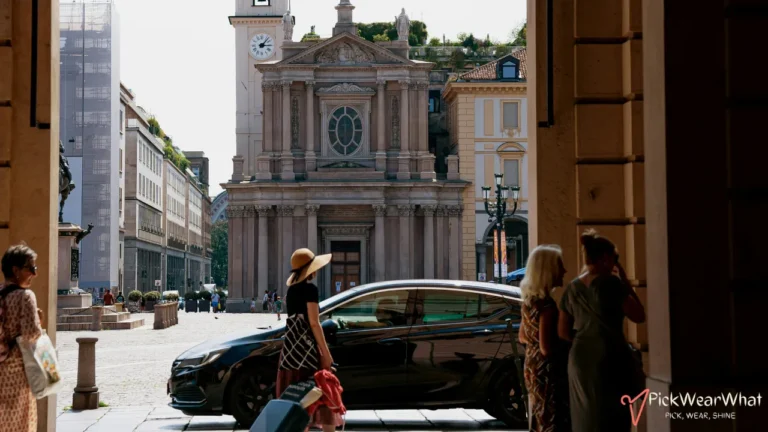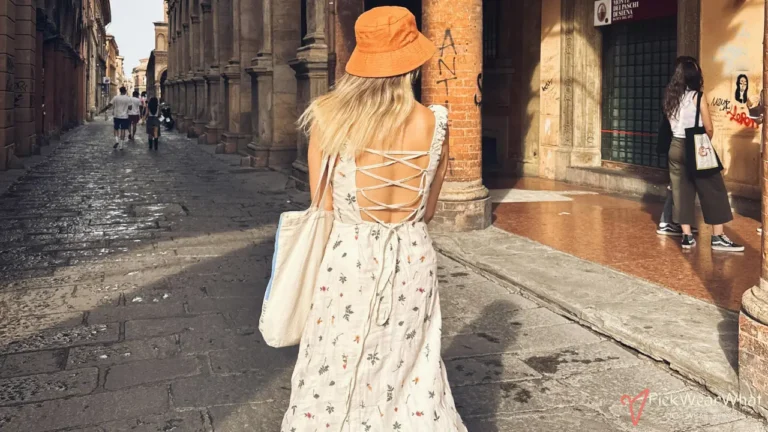In 2025, visitors to Venice should bring adaptable layers, breathable fabrics, and water-resistant footwear because temperatures swing from near-freezing lagoon mists in winter to humid midsummer heat, while rainfall can strike at any time.
What To Wear In Venice By Month From Jan To Dec?
Venice’s maritime climate shifts noticeably from month to month: fog and “acqua alta” flood tides dominate mid-winter, spring breezes arrive quickly, humid heat peaks in July, and mellow sunshine illuminates autumn before the damp cold returns. Packing smartly month-by-month helps you stay comfortable on vaporetto decks, maze-like calli, and marble church floors. The table below offers a quick snapshot for both men and women, balancing local style with practical comfort.
| Month | Average High / Low | Men – Core Pieces | Women – Core Pieces | Extras & Footwear |
|---|---|---|---|---|
| January | 6 °C / 0 °C | Wool overcoat, merino base layer, dark jeans | Long wool coat, thermal tights under trousers | Waterproof leather boots, knit beanie, touchscreen gloves |
| February | 7 °C / 1 °C | Layered knit sweater under jacket, scarf | Knee-length coat, cashmere scarf | Wool socks, compact umbrella |
| March | 12 °C / 4 °C | Lightweight parka, cotton shirt, chinos | Trench coat, light sweater, midi skirt with tights | Waterproof sneakers, foldable rain hat |
| April | 17 °C / 8 °C | Unlined blazer, polo, slim trousers | Cardigan over blouse, ankle-length pants | Loafers with grip, sunglasses |
| May | 22 °C / 12 °C | Breathable linen shirt, tailored shorts | Linen dress or culottes, light shawl | Boat shoes, straw fedora |
| June | 26 °C / 16 °C | Short-sleeve button-down, chino shorts | Sleeveless cotton dress, light cardigan for evenings | Sandals with arch support, sun hat |
| July | 28 °C / 18 °C | Moisture-wicking polo, seersucker shorts | Flowy sundress, UV-blocking wrap | Canvas espadrilles, refillable water bottle |
| August | 28 °C / 18 °C | Breathable tee, lightweight trousers for churches | Light maxi dress, airy blouse | Odor-control socks, handheld fan |
| September | 24 °C / 15 °C | Cotton-blend blazer, roll-sleeve shirt | Midi dress with sleeves, silk scarf | Low-profile sneakers, light rain jacket |
| October | 18 °C / 10 °C | Waxed cotton jacket, crew-neck sweater | Corduroy skirt with tights, cropped jacket | Water-resistant loafers, compact umbrella |
| November | 12 °C / 5 °C | Quilted jacket, thermal long-sleeve | Wool-blend coat, knit dress with leggings | Rubber-soled boots, travel umbrella |
| December | 7 °C / 1 °C | Insulated parka, cashmere beanie | Puffer coat, fleece-lined pants | Waterproof boots, heat-tech gloves |
Venetian winters are coldest in January, averaging 4 °C, while July tops out around 24 °C on average, showing just how wide the wardrobe gap can be.
What To Wear In Venice By Season
Seasonal packing streamlines decisions if your travel dates are flexible. Each season brings its own palette of temperatures, humidity levels, and cultural events—from winter carnival masks to steamy summer regattas. The overview below separates men’s and women’s essentials, highlighting fabrics, layering tricks, and accessory must-haves.
| Season | Temperature Range & Conditions | Men – Key Garments | Women – Key Garments | Must-Have Accessories |
|---|---|---|---|---|
| Winter (Dec-Feb) | 0 – 7 °C; damp fog, possible acqua alta | Heavy wool coat, thermal base layers, water-resistant boots | Insulated long coat, heat-retaining tights, waterproof leather boots | Wool scarf, gloves, rubber-sole shoe protectors |
| Spring (Mar-May) | 4 – 22 °C; cool mornings, light rain showers | Transitional trench, mid-weight sweater, chinos | Trench coat, cardigan, ankle-length jeans | Compact umbrella, sunglasses |
| Summer (Jun-Aug) | 16 – 29 °C; high humidity, occasional storms | Linen shirts, breathable shorts, boat shoes | Cotton sundress, linen tops, airy skirts | Wide-brim hat, refillable water bottle |
| Autumn / Fall (Sep-Nov) | 5 – 24 °C; mild days, increased rainfall | Waxed jacket, layerable knits, dark jeans | Midi dress with cardigan, tights, waterproof loafers | Lightweight scarf, fold-away rain jacket |
May, September, and November bring the highest rainfall—up to 141 mm in peak months—so even outside winter you’ll want reliable rain protection.
Navigating Venetian Weather Patterns
Venice’s lagoon buffers extreme cold but traps humidity, meaning dampness rather than temperature often dictates comfort. Fog rolling off the water clings to stone alleys, and sudden squalls can turn Piazza San Marco slick within minutes. Understanding these microclimates allows travelers to combine breathable fibers like cotton or bamboo with quick-dry synthetics, ensuring warmth without bulk. Carrying a lightweight waterproof layer is advisable year-round since even summer sees roughly 45–70 mm of monthly rain.
How Does Humidity Affect Fabric Choices?
Although the mercury might not soar as high as inland Italian cities, Venice’s humidity can make a modest 26 °C feel sweltering. Moisture-wicking shirts, open-weave linen, and airy skirts prevent overheating. Conversely, damp winter air penetrates cotton quickly, so merino wool—capable of insulating even when wet—proves invaluable during cold snaps.
Packing Tips For Canal City Explorers
Venice is famously walkable, but “walkable” here means uneven paving stones, arched bridges, and occasional ankle-deep puddles. Trolleys wobble, and high-heeled shoes snag between slabs. Prioritizing supportive, non-slip footwear preserves both style and knees while you haul your bag over bridges. Pack compact tote bags too: many vaporetto routes fill during rush hour, and a bulky backpack can be unwieldy on crowded decks.
Should You Bring Rubber Boots For Acqua Alta?
From late autumn through early spring, tide-driven floods unpredictably raise canal levels. Most locals slip lightweight PVC overshoes over their regular footwear rather than carrying knee-high rubber boots. They fold flat in luggage, cost little from street vendors, and keep socks dry when boardwalks aren’t installed yet.
Footwear Choices For Cobblestone Streets
Shoes in Venice need sturdy soles to diffuse pressure from hard stone but flexible uppers for stair climb after stair climb. Men do well with hybrid sneaker-loafers sporting textured rubber soles; women gravitate toward low-block heeled ankle boots or cushioned ballet flats. In summer, leather sandals with molded footbeds outperform flimsy flip-flops, providing grip on wet vaporetto floors.
What About Dress Codes In Restaurants?
While Venice leans tourist-friendly, evening trattorias and classical music halls expect tidy footwear. Clean sneakers pass in casual bacari bars, but refined venues such as Teatro La Fenice still prefer closed-toe shoes. Pack one pair of smart leather loafers or simple pumps to cover upscale dinners without overloading your suitcase.
Accessorizing Against Sun And Rain
Weather extremes in Venice often arrive together: searing sun at noon, abrupt showers by three. A UV-proof travel umbrella doubles as instant shade, while polarized sunglasses reduce canal-surface glare. A cotton bandana or stylish silk foulard shields the neck from both sunburn and brisk lagoon breezes, blending seamlessly with Venetian fashion sensibilities.
Are Transparent Ponchos A Tourist Giveaway?
Clear plastic ponchos certainly mark you as visitor, but locals value practicality over fashion during deluges. Opt for a neutral-colored, thigh-length packable raincoat; it looks sharper in photos, sheds water quickly, and pairs with casual or smart outfits alike.
Balancing Style And Respectful Attire In Churches
Venice’s basilicas enforce modesty: shoulders and knees covered, hats removed inside. Men can drape a light linen shirt over a tee; women frequently keep a chiffon wrap in their day bag to convert a sleeveless dress instantly. This small concession ensures admission to mosaicked wonders such as St. Mark’s Basilica without scrambling to buy paper shawls at the door.
What Fabrics Keep You Cool Yet Modest?
Lightweight rayon or fine cotton poplin offers opaque coverage without trapping heat. A knee-length A-line skirt sways comfortably on ferry decks and respects church guidelines, proving more versatile than short shorts that might limit entry.
Dressing Smartly For Vaporetto Rides
Public waterbuses generate cool breezes that can feel chilly after sun-soaked walks. A compressible windbreaker or cotton-cashmere cardigan slipped into a daypack balances temperature swings. Avoid overly billowy garments—gusts on open decks can send wide scarves flying straight into the lagoon.
Do Water Taxis Have Dress Expectations?
Private water taxis cater largely to hotels and may recommend smart-casual attire if you are sailing directly to a gala or wedding venue. A wrinkle-resistant blazer kept in garment-fold form allows men to upgrade instantly; women might choose a structured shrug to polish a daytime ensemble.
Layering Strategies For Shoulder-Season Travel
Spring and autumn boast mild temperatures but unpredictable storms. Dressing “in threes” works well: a breathable base, an insulating mid-layer, and a weatherproof shell. Remove or add as needed while sipping espresso along the Zattere promenade. Neutral palettes—navy, camel, olive—simplify mix-and-match outfits, creating multiple looks from minimal items.
How Many Layers Are Too Many?
Aim for two to three thin layers rather than one bulky sweater; this traps warm air efficiently, dries faster if wet, and fits better under compact rain jackets. Packable down vests weigh almost nothing yet fend off evening chills on rooftop terraces.
Evening Wear: Canal-Side Elegance Without Overpacking
Dinner by candlelight on a floating pontoon demands chic attire that survives damp breezes. Men: dark chinos, crisp shirt, unstructured blazer. Women: midi wrap dress paired with a lightweight shawl. Both: polished yet comfortable shoes for the long walk home when vaporetti slow at night.
Are Jeans Acceptable At Upscale Venues?
Dark, well-fitted denim paired with a blazer passes in many modern Venetian restaurants. Avoid distressed styles; combine with leather loafers rather than athletic trainers to meet the “smart casual” bar.
Sustainable Packing: Respecting Lagoon Ecology
Fast-dry garments reduce energy-hungry laundromat visits; reusable bottles cut plastic waste. Choose reef-safe sunscreen—canal discharge ultimately meets the Adriatic. Many hotels provide filtered water stations; refilling here lessens rubbish that clogs fragile tidal ecosystems.
Where Can You Recycle Clothes In Venice?
Several cooperative bins near Piazzale Roma accept unwanted textiles; donating an extra sweater you no longer need reduces luggage weight and supports local charities.
Frequently Asked Questions About Dressing For Venice
Is There A Strict Dress Code For Visiting St. Mark’s Basilica?
Yes. Shoulders and knees must be covered for all genders, and hats removed. Lightweight wraps and long trousers ensure smooth entry.
Do I Need A Heavy Coat In March?
Bring a mid-weight trench plus a thin thermal layer. Mornings can hover around 8 °C, but afternoons warm up quickly.
Are Shorts Acceptable For Men In Summer?
Tailored, knee-length shorts are fine in most outdoor settings. Carry lightweight trousers for churches or fine-dining evenings.
Will My Sneakers Work On Rainy Days?
Only if they have proper tread and water-resistant uppers. Consider hybrid waterproof sneakers or apply a shoe-protecting spray beforehand.
How Often Does It Flood In Autumn?
High tides are most common from October to December; city sirens give advance notice, and raised walkways appear in major squares.
Can I Wear Sleeveless Tops In Museums?
Most museums allow sleeveless tops, but always pack a light shawl; certain church-run galleries may apply stricter rules.
You Can Also Read:




